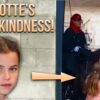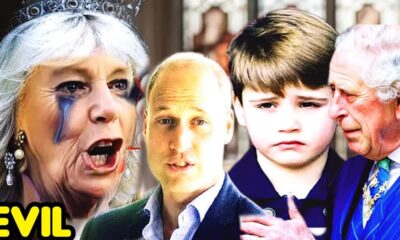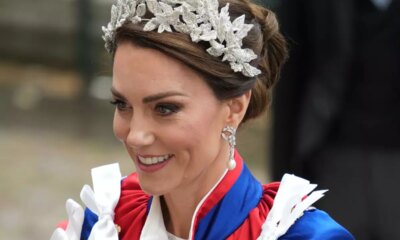Must Read
Royal Watchers Amazed as Artificial Intelligence Reveals Glimpse into Future of Prince George, Princess Charlotte, and Prince Louis
The British royal family, known worldwide for their long-standing reign and the fascination surrounding the younger generation, has captivated the public's attention once again.
Prince George, Princess Charlotte, and Prince Louis, three of the most famous children in the world, have been subjects of an intriguing experiment utilizing artificial intelligence (AI).
Enthusiasts have employed rendered images created by AI to artificially age the adorable youngsters, providing a glimpse into what they might look like in their 20s.
In a video showcasing the astonishing results, one fan transformed young Charlotte into a fully-grown adult, leaving followers in awe.
Comparisons were drawn between her and the Queen, as well as her late grandmother, Princess Diana.
The consensus among fans is that Charlotte will undoubtedly inherit the stunning beauty of both her mother and grandmother.
The virtual aging process was also applied to Charlotte's brothers, Prince George and Prince Louis, revealing them as handsome young men with charming smiles and floppy hair.
Regardless of their appearance, it is widely believed that their good genes will ensure their undeniable beauty.
While the Wales children are destined for roles as working royals, their parents have made it a priority to provide them with a normal upbringing within the confines of the royal family.
However, they are allowed to act just like any other children their age.
What may come as a surprise is that Princess Catherine has taken inspiration from Princess Diana's parenting approach, particularly when it comes to connecting with her children on their level.
Catherine has been spotted crouching down to speak to her children, offering reassurance during public engagements.
Similar to her late mother-in-law, she can often be seen holding their hands or giving them comforting gestures like a pat on the back or a gentle stroke of their hair.
Despite these confidence-building techniques, it is important to note that the royal mothers are not averse to disciplining their children.
After all, both women have given birth to future kings.
Insiders have revealed several ways in which the Wales family's lifestyle differs from that of ordinary youngsters.
These differences include a ban on iPads, as Princess Catherine firmly believes that childhood should be filled with toys, outdoor play, and the cultivation of an active imagination.
However, it seems that the children do not always get to keep those toys, as there is a rule in place that restricts them from keeping certain gifts provided by the public.
This requirement applies to all members of the royal family, who are only allowed to keep gifts valued below €150, with exceptions made for items like flowers and select foods.
In addition to these rules, the royal children also adhere to strict eating and sleeping schedules.
Fast food is strictly prohibited in the Wales household, and the children are expected to eat whatever is placed before them without fussing.
Even when dining at the prestigious Hurlingham Club in London, there are no tantrums or food-throwing incidents.
When it comes to electronics, Princess Catherine has made it clear that iPads are not meant for children.
Instead, she and Prince William encourage their children to engage in imaginative play and outdoor activities.
The royal children's daily routines are meticulously managed by their Norland nanny, Maria Borrello, who ensures they have designated times for sleep and play.
Additionally, they have a strict bedtime of 7 p.m. and are expected to nap when their parents attend events together.
The responsibility of deciding how the three siblings rest lies with their parents, who undoubtedly prioritize their well-being.
As the world eagerly watches the British royal family, the AI-generated images provide a fascinating glimpse into the future of Prince George, Princess Charlotte, and Prince Louis.








































